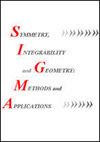一种具有偏心圆轨道的新势
IF 1
3区 物理与天体物理
Q2 MATHEMATICS
Symmetry Integrability and Geometry-Methods and Applications
Pub Date : 2022-07-20
DOI:10.3842/SIGMA.2023.001
引用次数: 1
摘要
牛顿在1687年出版的《自然哲学的数学原理》第一卷第七命题第二题中提出并回答了如下问题:假设在中心力场中运动的粒子的轨道是偏离中心的圆。力的大小如何取决于粒子在圆上的位置?在这篇文章中,我们确定了一个可以产生这样一个力的势能,只有在零能量的情况下。我们进一步将这个势域中的零能量轨道映射到球面上的有限能量自由运动轨道;这种对偶是古尔萨在1887年得出的一般结果的一个特例。这张图本身是一个逆立体投影,这一事实解释了我们感兴趣的系统中零能量轨道的圆度。最后,我们确定了一个额外的运动积分——类似于库仑问题中的龙格-伦茨向量——它负责我们问题中零能量轨道的接近程度。本文章由计算机程序翻译,如有差异,请以英文原文为准。
A Novel Potential Featuring Off-Center Circular Orbits
In Book 1, Proposition 7, Problem 2 of his 1687 Philosophiae Naturalis Principia Mathematica, Isaac Newton poses and answers the following question: Let the orbit of a particle moving in a central force field be an off-center circle. How does the magnitude of the force depend on the position of the particle onthat circle? In this article, we identify a potential that can produce such a force, only at zero energy. We further map the zero-energy orbits in this potential to finite-energy free motion orbits on a sphere; such a duality is a particular instance of a general result by Goursat, from 1887. The map itself is an inverse stereographic projection, and this fact explains the circularity of the zero-energy orbits in the system of interest. Finally, we identify an additional integral of motion - an analogue of the Runge-Lenz vector in the Coulomb problem - that is responsible for the closeness of the zero-energy orbits in our problem.
求助全文
通过发布文献求助,成功后即可免费获取论文全文。
去求助
来源期刊
CiteScore
1.80
自引率
0.00%
发文量
87
审稿时长
4-8 weeks
期刊介绍:
Scope
Geometrical methods in mathematical physics
Lie theory and differential equations
Classical and quantum integrable systems
Algebraic methods in dynamical systems and chaos
Exactly and quasi-exactly solvable models
Lie groups and algebras, representation theory
Orthogonal polynomials and special functions
Integrable probability and stochastic processes
Quantum algebras, quantum groups and their representations
Symplectic, Poisson and noncommutative geometry
Algebraic geometry and its applications
Quantum field theories and string/gauge theories
Statistical physics and condensed matter physics
Quantum gravity and cosmology.

 求助内容:
求助内容: 应助结果提醒方式:
应助结果提醒方式:


